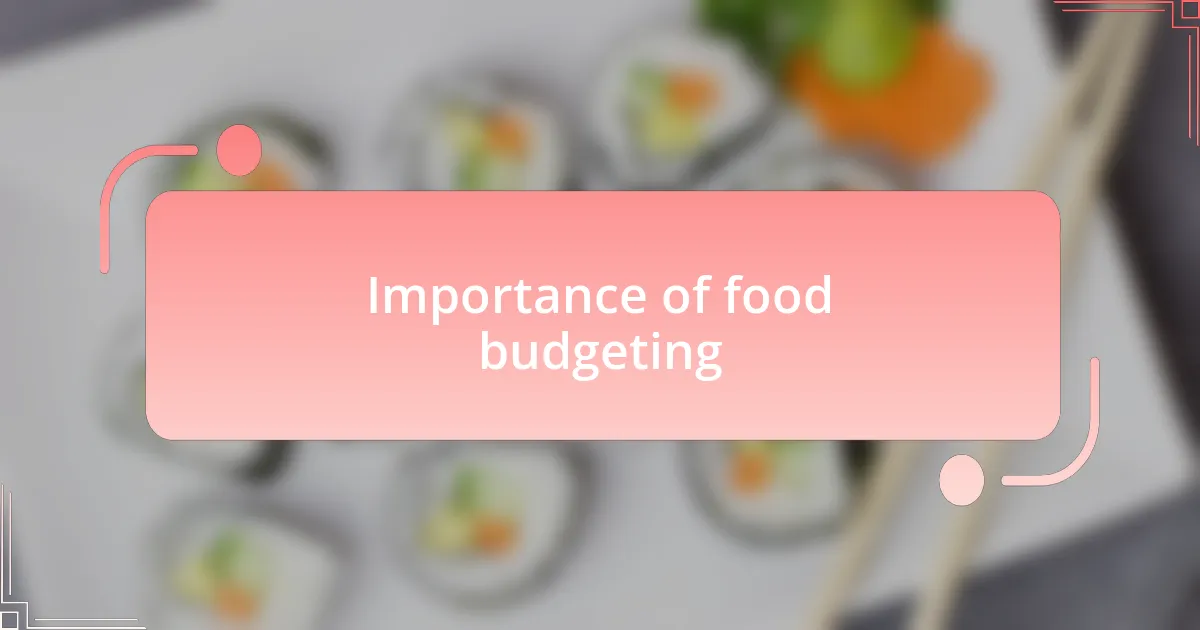Key takeaways:
- Healthy eating involves a balanced diet with whole foods, enhancing physical health and emotional satisfaction.
- Food budgeting helps reduce waste, make smarter choices, and prioritize nutritious foods over processed items.
- Meal planning strategies such as creating weekly menus and batch cooking can save time and money while minimizing food waste.
- Tracking food expenses through spreadsheets or apps reveals spending habits and encourages mindfulness in grocery shopping.

Healthy eating definition
Healthy eating refers to consuming a balanced diet that provides the essential nutrients your body needs to function optimally. It involves integrating a variety of foods, such as fruits, vegetables, whole grains, lean proteins, and healthy fats, while minimizing processed foods and added sugars. I remember a time when I didn’t understand the true meaning of healthy eating and often chose convenience over nutrition. Looking back, I realize how crucial it is to make informed choices.
Moreover, healthy eating isn’t just about the types of food you consume; it’s also about how those foods make you feel. Have you ever noticed the difference in your energy levels after a meal? When I prioritize whole foods, I feel more vibrant and energized, which is a stark contrast to days filled with processed snacks. It’s fascinating how our food choices can impact our mood and overall well-being.
Ultimately, healthy eating is about developing a sustainable lifestyle that supports both physical health and emotional satisfaction. It’s about finding that balance that makes you feel good from the inside out. I’ve often found joy in experimenting with new recipes that include nutrient-dense ingredients, which not only nourishes my body but also satisfies my taste buds. What better way to enjoy health than to savor every bite?

Importance of food budgeting
Understanding the importance of food budgeting can transform the way we approach our meals. I remember my early days of grocery shopping where I’d often overspend, sometimes on items I didn’t even need. By setting a budget, I gained a clearer perspective on what I could afford and what truly mattered in my diet.
Food budgeting isn’t just about saving money; it’s also about making smarter decisions. Have you ever felt overwhelmed in the grocery aisle with so many choices? I certainly have. By planning my meals and allocating a portion of my budget for nutritious foods, I’ve learned to prioritize quality over quantity, making my meals healthier and more satisfying.
Another key aspect of food budgeting is reducing waste. It’s heartbreaking to toss out expired food that I thought I’d use. Since I’ve become diligent about tracking my spending and planning meals accordingly, I’m not only saving money but also minimizing food waste. It’s a win-win: I eat better and feel more responsible about my choices.

Strategies for effective meal planning
One effective strategy I’ve found for meal planning is to create a weekly menu based on what’s already in my pantry. Occasionally, I’ll discover ingredients that I’ve forgotten about, and incorporating them into my meals not only helps reduce waste but also sparks my creativity in the kitchen. Have you ever found a random can of beans or a half-used spice that turned into a delicious surprise? It’s often those little victories that make meal planning feel less like a chore.
Another tactic that has significantly helped me is batch cooking. On weekends, I take a few hours to prepare meals that I can store for the week. I remember the first time I made a big batch of chili; I froze half of it, and it became my lifesaver on busy nights. There’s something comforting about knowing I have a nutritious meal ready to go, and it really contributes to my overall food budget when I don’t resort to takeout.
Lastly, I always keep an eye on seasonal produce. Shopping based on what’s in season not only boosts the flavor of my meals but also keeps costs down. I recall a summer filled with ripe tomatoes, which I used to whip up homemade sauces. The freshness of those ingredients made a simple dish taste extraordinary while aligning perfectly with my budget goals. Doesn’t it feel good when a meal turns out better than expected, all while being easy on the wallet?

Shopping tips for healthy eating
When I walk into the grocery store, I make it a point to stick to my shopping list. I’ve learned from experience that wandering the aisles often leads to impulse buys—those shiny packages of snacks or fancy sauces that end up gathering dust. Have you ever purchased something on a whim only to realize it wasn’t necessary? By adhering to my list, I stay focused on nutritious staples that keep my meals vibrant and healthy.
Another strategy that’s served me well is to explore local markets. Not only do I find excellent deals on fresh fruits and vegetables, but I also enjoy connecting with farmers and local vendors. There was one Saturday morning when I stumbled upon a small farm stand offering organic kale for half the price of the supermarket. The vibrant green leaves inspired me to create a hearty salad that became a family favorite. Have you experienced the joy of discovering hidden gems at local markets?
Finally, I prioritize shopping for whole foods rather than processed items. On days when I fill my cart with grains, legumes, and fresh produce, I feel a sense of accomplishment—it’s like I’m investing in my health. I recall a time when I switched to buying bulk dried beans instead of canned ones. Not only did I cut down on costs, but I also enjoyed the process of soaking and cooking them from scratch. What small changes have you made to your shopping habits that have transformed your meals?
![]()
Tracking your food expenses
One effective way I’ve learned to track my food expenses is by keeping a simple spreadsheet. Every time I shop, I jot down what I spend, and this practice really opened my eyes to where my money goes. Have you ever felt like your grocery bill was surprisingly high? By tracking my purchases, I’ve pinpointed areas where I can cut back, like those high-priced organic snacks I thought I needed.
In my experience, using a dedicated app has also been a game changer for tracking expenses. I love being able to categorize my spending on fruits, vegetables, and pantry staples. It’s rewarding to see the breakdown and realize how much I save by sticking to my whole food mantra. Have you tried using technology to manage your budget? I once noticed I was spending too much on coffee beans, prompting me to start brewing at home instead of hitting the café—an easy money-saver.
Sometimes, I even take a moment at the end of the week to reflect on my receipts. I find this review process enlightening; it shows me patterns in my spending and helps identify any unexpected splurges. When I realized I was buying too many specialty items, I shifted my focus back to my essentials, bringing balance back to my budget. What habits do you think could help you become more mindful of your grocery expenditures?

Personal experiences with budgeting
Managing a food budget is something I’ve learned to navigate over time, especially during a phase when money was tight. I remember a particular month when I ran out of funds before payday—an eye-opener that pushed me to rethink my grocery shopping habits. Have you ever found yourself in a similar situation? It took that experience for me to prioritize planning meals and creating a list, which cut down on impulse buys that often led to regret.
I once tried a more relaxed approach, thinking I’d just “wing it” at the store, but it backfired. I came home with items that were not only unnecessary but didn’t align with my healthy eating goals. This frustrating moment reminded me that budgeting is as much about discipline as it is about choice. I find myself asking: how often do we buy things that look appealing but don’t serve our long-term health? This reflection changed my perspective on food shopping entirely.
Embracing a budgeting mindset has also allowed me to get creative in the kitchen. I recall experimenting with bulk staples like rice and beans, transforming what could have been boring meals into delicious and nutritious dishes. This experience taught me that being budget-conscious doesn’t mean sacrificing flavor or nutrition. Instead, it’s an invitation to explore new recipes and make healthier choices without breaking the bank. What new dishes could you uncover by thoughtfully managing your food budget?

Lessons learned from my journey
Lessons learned from my journey
Through my experiences, I’ve learned that flexibility is key. There were months when unexpected expenses popped up, and I had to make quick adjustments to my food budget. I remember one week when my car broke down, forcing me to choose between eating out or sticking to my grocery budget. I chose the latter and discovered how creative I could get with limited ingredients. Have you ever found a hidden talent for improvisation when life throws challenges your way? This taught me that with a little creativity, I could not only stick to my budget but also enjoy the process.
Another important lesson I’ve picked up is the value of seasonal shopping. The first time I dared to shop based on what was in season, I was amazed. Not only did I save money, but I also tasted vegetables and fruits at their peak freshness. I recall biting into a ripe plum during the summer—its sweetness was so much better than anything I could find during off-seasons. How often do we miss out on nature’s bounty simply because we ignore the seasonality of food? Understanding this connection enhanced my appreciation for food and helped my wallet.
Finally, I realized that tracking my spending is essential. Initially, I resisted this idea, thinking it would be tedious. However, I found that logging my expenses turned into a fulfilling practice. I could see where my money was going and identify habits I wanted to change. It was shocking to realize how much I spent on snacks! Do you ever ask yourself where your unexpected expenses come from? This self-reflection was empowering and led me to make informed choices that aligned with my values, especially when it came to healthy eating.